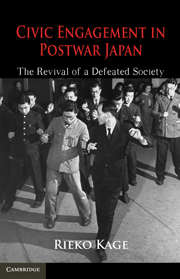Book contents
- Frontmatter
- Contents
- List of Tables
- List of Figures
- Preface
- Acknowledgments
- Civic Engagement in Postwar Japan
- 1 Introduction
- 2 Civic Engagement: The Dependent Variable
- 3 War and Civic Engagement: A Theoretical Framework
- 4 Quantitative Analysis: The Rise of Civic Engagement across Forty-Six Japanese Prefectures
- 5 The Long-Term Effects of Wartime Mobilization: Cross-National Analysis
- 6 Repression and Revival of the YMCA Japan
- 7 Wartime Endorsement and Postwar Repression of a Traditional Art
- 8 Civil Society and Reconstruction in Postwar Japan
- 9 Conclusions
- References
- Index
9 - Conclusions
Published online by Cambridge University Press: 06 December 2010
- Frontmatter
- Contents
- List of Tables
- List of Figures
- Preface
- Acknowledgments
- Civic Engagement in Postwar Japan
- 1 Introduction
- 2 Civic Engagement: The Dependent Variable
- 3 War and Civic Engagement: A Theoretical Framework
- 4 Quantitative Analysis: The Rise of Civic Engagement across Forty-Six Japanese Prefectures
- 5 The Long-Term Effects of Wartime Mobilization: Cross-National Analysis
- 6 Repression and Revival of the YMCA Japan
- 7 Wartime Endorsement and Postwar Repression of a Traditional Art
- 8 Civil Society and Reconstruction in Postwar Japan
- 9 Conclusions
- References
- Index
Summary
Conventional accounts of the impact of war on civil society typically paint a bleak picture of the prospects for civic life in the wake of wartime defeat. Defeat usually reduces incomes, interrupts education, and inflicts psychological trauma on a citizenry, all of which should lead citizens to withdraw from public life. By contrast, in victorious countries, it is argued, as these damages tend to be much more limited, there should be no fall, and possibly even a rise, in levels of civic engagement in the immediate postwar period.
This project has questioned this conventional wisdom. As argued in Chapter 1, Japan in the wake of World War II provides a key case for examining the relationship between war and the postwar growth of civic engagement. Since Japan was so thoroughly defeated by 1945, if the conventional political science wisdom were correct, it would be an especially unlikely case in which to find any increase in postwar levels of civic engagement. Wartime destruction was severe, postwar economic conditions deteriorated precipitously, and educational opportunities were cut short on a large scale. Moreover after the war, the experience of foreign occupation, as well as the series of occupation reforms that sought to thoroughly remake not only Japan's preexisting political and economic institutions but even the Japanese mind, could easily have added a new layer of trauma and even a demobilizing culture of defeatism. Yet, despite all of these adverse conditions, civic life actually blossomed in immediate postwar Japan.
- Type
- Chapter
- Information
- Civic Engagement in Postwar JapanThe Revival of a Defeated Society, pp. 161 - 170Publisher: Cambridge University PressPrint publication year: 2010

